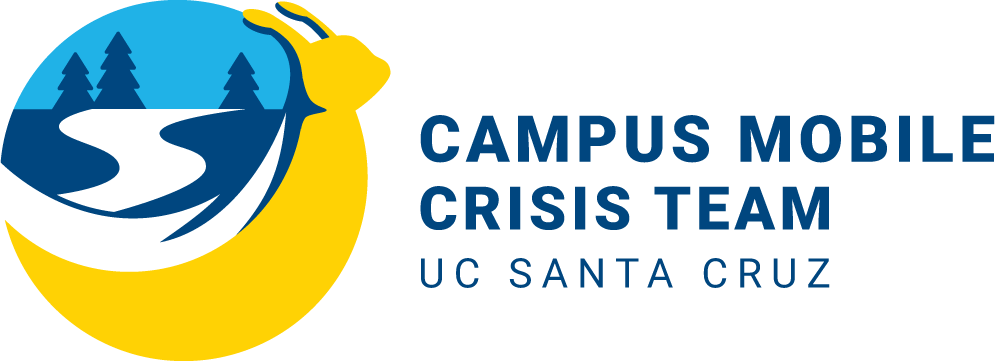FAQ Campus Mobile Crisis Team
CMCT is described as responding to a “behavioral health crisis” – what does that mean?
“Behavioral health” is a collective term which encompasses mental health and substance use conditions. A behavioral health crisis is when an individual is experiencing either a mental health or substance use reaction that is beyond their usual ability to cope.
How does CMCT de-escalate a situation when someone is yelling/screaming?
Staff are trained in numerous techniques that have been proven to de-escalate a situation. Some of the interventions include, but are not limited to: crisis counseling, motivational interviewing, and cognitive behavioral therapy techniques (exploring the impact of one's thoughts on their behaviors).
How are CMCT services dispatched?
The team is sent out through calls made to the UCSC Dispatch Team. Callers should use the CMCT dedicated line at (831) 502-9988. Calls to 911 or UCPD may also meet criteria for the CMCT to respond.
Who makes up the team?
CMCT will be composed of a mental health worker known as a Crisis Intervention Specialist, teamed with an Emergency Medical Technician (EMT) or two mental health workers.
Can I call CMCT for myself?
Callers may request help for themselves or others. CMCT is available for anyone who meets criteria: an individual experiencing a behavioral health crisis and not exhibiting a threat to others.Will I get in trouble if I call the CMCT line and my situation needs something else?
No. Dispatchers are trained to ask a series of questions designed to get you the help you need. Don’t hesitate to call if you think there might be a need.
What locations will CMCT serve?
Currently CMCT is offered for all locations of the UCSC campus.
Will law enforcement arrive if I call for CMCT services?
While a goal of CMCT is to offer a non-law enforcement option, law enforcement presence is determined based on a set criteria for safety and information provided by the caller. The presenting situation will determine if CMCT or another responding agency such as Fire and Ambulance Services, police, or a co-response are appropriate.Additionally, there may be times where law enforcement is needed if the situation escalates and becomes a safety issue when the CMCT is on scene.
What if I call for CMCT and the dispatcher determines I need law enforcement, can I cancel the request?
Criteria to dispatch law enforcement is based on risk and safety and ultimately the decision to cancel the request will be based on the severity of the safety risk.
What is the response time of CMCT?
Response times are based on the availability of the team to respond and are prioritized depending on the urgency of the call. Given the size of the UCSC campus, approximately 10 to 30 minutes is the expected response time. Be aware that the CMCT does not respond with lights and sirens and is subject to campus traffic conditions.
Services provided by the Team
What type of services might an individual receive through CMCT?
The services offered will depend on the symptoms and the behavior of the person in crisis.
- If an individual needs more support than what can be provided by the CMCT, the CMCT may provide transportation to the crisis stabilization unit, the Emergency Room, or other appropriate locations.
- Once the individual is no longer in crisis, the CMCT can provide referrals and recommendations to link and connect the individual to Health Services as needed, such as: Student Health Center, Counseling and Psychological Services, Student Health Outreach & Promotion, Campus Advocacy Resources & Education, substance use programs at the Cove, or other helpful campus or community resources.
- It is the goal of CMCT to provide support using the least restrictive means possible while empowering individuals to make their own decisions that will lead to beneficial outcomes.
What does CMCT do if they arrive and someone is exhibiting assaultive behaviors, such as throwing objects, punching walls, or making verbal threats to harm others?
If a person in crisis presents with assaultive behaviors to self, other campus community members, or team members, CMCT will request assistance from UCSC PD to assist in keeping all parties involved as safe as possible.
Does the CMCT provide services in languages other than English?
The CMCT utilizes the Language Line when staff are not available that speak in your preferred language.
Is there a cost for CMCT services? Will I receive a bill for services or transportation?
There is no cost associated with a CMCT response for the recipient of services.
What does CMCT do if they arrive and the person tells them to leave?
CMCT will leave given CMCT is a voluntary service, and individuals are not required to receive services from them if they don’t wish to. If there is an imminent safety concern, law enforcement or EMS (emergency medical services) will be engaged to respond.
Who can I contact if I would like CMCT training and education for groups?
The CMCT Supervisor mjmurphy@ucsc.edu. Please note that this email is not for urgent matters and that the main CMCT number should be used for all other inquiries.
Learn more about national mobile crisis teams

